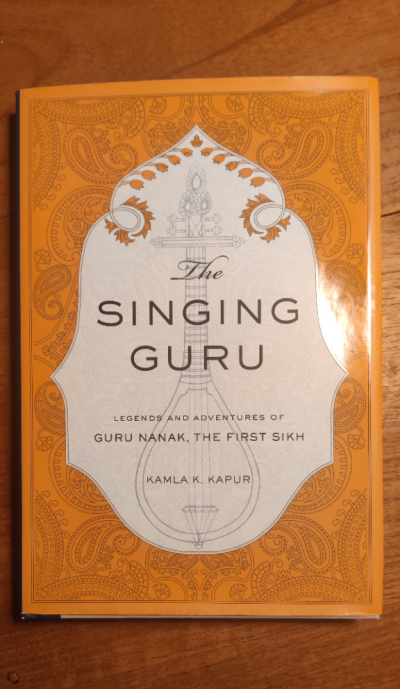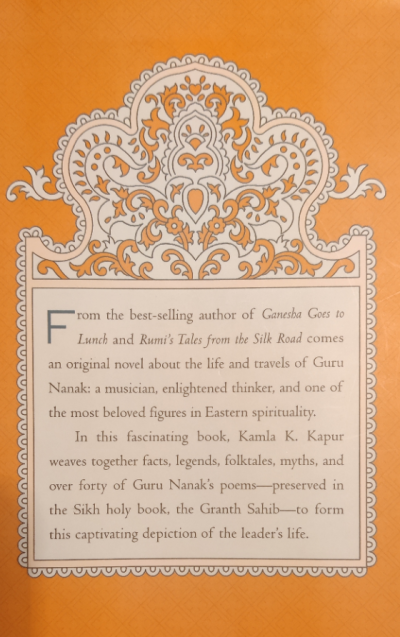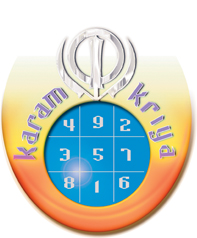Day 13 of the Cherdi Kala Yoga Advent Calendar
BOOK RECOMMENDATION
The Singing Guru
by Kamla K. Kapur
An excerpt from The Singing Guru:
CHAPTER 1
Mardana, the Unhappy Human
Two pilgrims paused in a bamboo grove to rest on a hot summer afternoon. Nanak, ten years younger than his companion Mardana, hung his wool blanket and few meager belongings on a branch and walked to a tiny spring nearby. He removed fistfuls of dead bamboo leaves and rotting mulch, which had choked its flow, until the clear water ov erflowed into the adjoining land and fed the thirsty earth.
“Come drink, Mardana,” he said to his companion. Sitting at the spring’s edge, Nanak cupped his hand and drank.
Mardana took off his satchel, leaned his rabab—the musical instrument he was carrying—against a rock, and collapsed on the ground. He felt unable to move, yet severe thirst made him crawl to the spring, put his face to it, and drink like an animal, lapping the water with his tongue. The cool liquid flowing into his parched mouth revived him a little, and he returned to the spot by his rabab and lay down as one dead.
Nanak proceeded to wash and clean himself in the spring before clearing the ground of stones, spreading his blanket, and lying down on it. Soon he was fast asleep.
Mardana lay in a heap, too tired to remov e the pebbles or to spread his blanket beneath him. A tired body and an ov eractiv e brain kept him too agitated to sleep. He was hungry and uncomfortable, and a v ague discontent at hav ing been away from the comforts of home for so long began to brew in Mardana’s mind. It quickly turned into a full-blown, raging unhappiness. How long, how very long have I been away from home? Do I even have a home? Mardana asked himself, repeating the question that had been foremost in his thoughts for quite a while. Twenty years—may be more, twenty -two, or three— what am I doing so far away from my homeland, from Fatima, my children, and my dog?
He looked at Nanak, who he called Baba, resting in the shade of the bam- boo grove, his arm folded under his head, his face radiant even in sleep.
Why can’t I be like Baba, so certain and centered, so detached from comfort or discomfort, satisfaction and hunger, prosperity and adversity ? Mardana thought, stretching upon the ground, longing for something soft beneath his body and head. He felt coarse and altogether too human compared to Nanak. Mardana was aware that he was rather attached to his appetites and vacillated too much between despair and joy . He felt like a Persian waterwheel, sometimes empty like the buckets clanking all the way down, and sometimes full and sloshing with sweet, clear water on the way up. He felt certain of the presence of God when things went his way, when he was provided for with food when he was hungry , a bed when he was sleepy , and the unexpected boat or bullock cart arriving on the riverbank when his bruised and blistered feet screamed in pain. But in adversity, the thin film of his faith dissolved, and he was certain that this whole philosophic construct of God was nothing but a pipe dream.
The image of the pipe brought with it a whole train of other desires. I could really do with a bowl full of bhang and a jar full of sweet red wine. All these hardships would be worth it if they were followed by some rewards.
He recalled how once, when Nanak and he had returned home to Sultanpur after a long journey , Fatima had been angry at Mardana and told him to go away and leave her alone. Mardana, upset, had gone to the village bhang shop and had some in a hookah, sitting in a circle with others, all pleasantly high and happy . He had returned home in an amorous mood and made up with Fatima. Wah! Wah! Allah himself had descended into their bed and bodies that night! As Mardana recalled the scene, his fingers reached out and traced the contours of his wife’s absent body .
Doesn’t Baba ever miss his wife? Mardana wondered. He hardly ever speaks about her, or even mentions his two sons. He is wedded to an intangible thing he calls Beloved, Husband, Guru, Akal Purakh, and the Timeless One. But I miss Fatima and the comfort of her in my arms, in our bed, her delicious cooking, and her ministrations when I am sick. Will I ever be with her again? Will I ever reach home and lead an ordinary life?
Mardana turned his mind to the image of the kind hostess in the last village where Baba and he had rested. Her features and face swam before his mind’s eye: her slim brown hand as it handed him the full glass of cinnamon- and cardamom-spiced milk; the shape of her body as she labored over the fire to make their meal; her arm jangling with bangles as she brought him the dinner plate arranged with delicious food; her face with its large, dark eyes, and the tiny dimple at the corner of her lips as she smiled at him in the morning while giving him a warm honey ginger drink. The more Mardana thought about her, the more his senses were inflamed, and the more agitated he became.
How much hav e I missed by following Nanak these many y ears? What have I got in return for following him, hungry and weary, for thousands upon thousands of miles, up and down steep cold mountains, through hot and windy deserts, over stormy seas and flooded riv ers and under thunderous skies? What do I have except an imperfect and chimerical wisdom? Wisdom is a poor substitute for real life, for simple human pleasures and joy. One doesn’t liv e forever, and the purpose of life is not some insight that comes and goes like fairy dust in the eyes of deluded fools. Baba talks about vague, intangible things, and I want certainties now, a life where the senses are fulfilled and at rest. Perhaps an ascetic life suits Baba Nanak, but I have had enough!
Sitting up, Mardana broke off a stalk of bamboo and peeled it to get to its edible heart. Chewing on the tender shoot, Mardana wondered why he followed Baba like a meek lamb. Lambs always get slaughtered in the end, he thought. Baba’s music and voice have entrapped my soul, and I can’t break away from the spell! Mardana stopped chewing as this thought flashed through his mind. Rage rose in him like a whirlwind. I have been cheated out of life by this magician!
It seemed to Mardana that for the first time in his life he understood with perfect clarity what he must do: break away from Baba and leave, never to return. He looked at Baba sleeping peacefully; he looked at his satchel that contained the quills, ink, and book in which he, Mardana, had written down Baba’s songs in painstakingly neat handwriting; he looked at the rabab, leaning against a boulder, the intricate mother-of-pearl inlays around its sound hole shining in the moonlight. In his fury he wanted to pick up the instrument and dash it to pieces on a boulder.
Mardana saw the dense jungle surrounding the small clearing in which they rested and was momentarily afraid at the thought of leaving, but his desire for freedom pushed the fear away.
Enraged by Nanak and his rabab, Mardana stood up, turned, and walked away, determined not to look back upon the causes of his frustration.
He walked with one clear intention—to get as far away as possible as fast as he could. Mardana forged ahead, re-creating in his mind the amorous night with Fatima. He was raging and he was angry at nature, kudrat, that giv es a man desires only to thwart them.
When he quieted down enough and looked back, so many trails led away from him that even if he had wanted to return, he couldn’t have found the way. “Just as well!” he said and continued down the same path, images of his longing crowding his mind.
“Yes, I will find a woman now,” he fantasized aloud. “Young and beautiful like the first bloom on the mango tree, smelling of fragrant sandalwood and roses. She will be waiting eagerly, her eyes filled with adoration for me. Perhaps her name will be . . . Razaa . . . yes, her name will be Razaa, the obedient one. She will be willing and submissive, unlike my Fatima. I will make a home with her, start another family, and I will never, ever leave. Besides, who knows what’s happened to my family in my long absence?”
A pang of guilt held him at the thought of Fatima—her high cheekbones, that dark mole on her chin, her quick and lively brown eyes that flashed in anger or annoyance just as frequently as they did with love and need. “Ah, my Fatima with her sharp tongue, always giving me a hard time about traveling and not being there for her. What a shrew she can be! And who knows what she’s been up to in my absence?”
Mardana paused. He clearly heard Nanak’s voice in his ears: “Why should I forget those with whom I have exchanged hearts?” He looked around, wondering if Nanak had followed him, but there was no one there. “The magician has gotten into my mind!” He clutched at his head as he fought his way through the darkening bushes. The sounds of beasts roaring, growling, and mating in the forest only inflamed his mind with feverish desire. Mardana thought about all his fights with Fatima and all the things he didn’t like about her, trying to pump up his resolve to seek fulfillment with another, convincing himself that his hunger must be quickly gratified. He punched his way through the thick underbrush into a large, circular clearing in the forest and stood transfixed at the marvelous sight before him.
The landscape was completely transformed from the jungle of a few moments ago. Mardana couldn’t even tell if it was night or day. Perched on a craggy hill that spiraled up, Mardana saw a formidable and imposing fortress with battlements, domes, and turrets. From its massive iron gate protruded huge brass spikes and hanging bronze bells. It seemed to Mardana that the fortress somehow hovered in the air and was lit by soft lights from both below and above. A valley with a meandering stream and a small village rested at the foot of the hill, in the shadow of the fortress. A festival and a feast were in progress, and enchanting flutes, strings, and drums filled Mardana’s ears as he moved toward the scene before him like an iron filing caught in the gravity of a large magnet. Slaughtered goats were being skinned and cut open, and women in colorful clothes were harvesting their organs in neat piles: skins for carpets, water bags, drumheads, saddlebags, and parchment; guts for twine and stringed instruments like rababs and dilrubas; hearts, livers, and tongues to be roasted as special delicacies. Some goats, minus their heads, were roasting on spits above open flames. The aromas of herbs and spices and the smell of dripping fat wafted to Mardana’s nostrils as he salivated over the scene, his teeth involuntarily masticating over the promised meal.
Wah! Wah! Mardana thought. This is the place. My heart has come home!
His intuition was confirmed when several of the women in colorful, sequined ghagras and cholis, sweet smelling and lovely to behold, noticed him and let out screams of delight, as if they had been waiting just for him. As they ran toward him, Mardana scanned their faces, each one lovelier than the next. His gaze rested on the one who wore a red dress. She smiled directly at him, and Mardana felt himself drowning in her eyes. Drawn to her without volition, he began walking toward her. All of the women immediately surrounded him, caressed his arms and back, and carried him as if on a wave, into the house.
“Mardana, Mardana, this is Maya’s magic, don’t fall into her entangled web! Your ego is creating these illusions.” Mardana heard Baba Nanak’s voice in his head as he bobbed on the crest of the wave. Oh Baba, stop all this moralizing and let me li e! Mardana replied irritably. I’ve had it with your magic and am ripe for some of Maya’s now.
A warm bath awaited Mardana, and the women took turns pouring water over him and scrubbing him down with fragrant soaps. His e es followed their movements while his heart and body swelled with pleasure and gratitude to Allah for fulfilling his secret desires. His gaze lingered on the woman of his choice, their eyes meeting every now and then, hers coy, his probing. She looked at him submissively, adoringly .
“What’s y our name?” Mardana asked.
“Razaa.”
All of Mardana’s doubts vanished. He knew that the reciprocal, bountiful nature of the universe had helped him to manifest his desires. I have created this with the power of my thoughts! Yes . . . I have learned much from Baba and am no longer the disciple, but a master creating magical realities!
The women teasingly dried him with soft towels, carried him to a canopied bed, laid him down on soft sheepskin rugs, and rubbed him down with fragrant, heady oils. They brought him the hookah, its bowl full of bhang buds, resins, and other fragrant herbs. Once he had his fill they massaged him and fed him by putting grapes and other berries into his mouth with their hennaed hands. All of them wanted Mardana. Juices dripped from the corners of his lips as they stroked his hair and giggled. He was at the pinnacle of his pleasures; his every desire had become flesh, all because he had stumbled upon the truth about the power of his own will.
In a moment he sketched out his future. One of the adjoining huts would be his own little home, his corner of the uni erse. It would be comfortable, not lacking in provisions, and Razaa would be there to service his every need. She would be sweet and compliant, like Fatima early in their marriage, before she aged and became more willful and sharp tongued. The lord or lady of the fortress would recognize his greatness as a singer and a rabab player, make him a court musician, and honor him with a small kingdom. He would lack for nothing for the rest of his life.
The women continued to dress him, and then put a chain around his neck. The chain felt tight and heavy. Never mind, he thought. Let them have their way with me! The perfume they put on him seemed to have a whiff of something like the urine of sheep or goats, but Mardana ignored the smell. Their singing, too, seemed like it had turned from mellifluous to cacophonous, like the agitated bleating of goats before slaughter. Perhaps he had overhead them slaughtering one for his dinner tonight. He was ravenous and couldn’t wait to eat.
Mardana recalled a feast he’d had in Emperor Babar’s tent once, long ago. Just the thought of it made him salivate: A plump, whole, roasted goat was brought in on a silver platter with carrots, peas, and potatoes garnished with roasted almonds, fried cashews, and raisins. There was fragrant basmati rice and all sorts of condiments and fruit. Mardana had torn off the leg of the goat and eaten it. Babar’s musicians had given him some bhang, and the drug had made the food taste a hundred times more delicious. Babar knew how to treat his musicians, unlike Baba, who wanted his minstrel to feed on air. Bhugat gian! Mardana scoffed. For food, wisdom.
Enough of poor asceticism! God himself gave humans these appetites, he reasoned.
The alluring and mischievous women put a crown of flowers on his head, put vermillion on his forehead, and raised him from the bed he lay upon. Mardana got up a little awkwardly, his heart filled to bursting with gratitude as he prepared to impress the women with his voice. He wished he had his rabab, but his voice alone was beautiful in its range and richness. Mardana opened his mouth to produce a soaring celebratory sound, but his voice came out raspy and hollow. He tried again, and again he heard a very strange bleating coming from his mouth. The girls were laughing hysterically, urging him to sing louder. He tried once more to burst into song, but what issued from his mouth was a high-pitched and vibratory “Mainnn . . . mainnnn . . . mainnn.” The women continued laughing. Mardana was dreadfully confused. What was happening? Why was he standing on all fours? He looked down at his feet and saw hooves at the end of thin, hairy legs; he looked up and saw that the women stood far above him instead of at eye level. Through the corners of his eyes he saw the flapping of long ears, and when he squinted, he saw twisted white horns on top of his head. “Am I hallucinating from the drugs? What is happening?” he tried to ask, but all he heard was a frenzied bleating and the answer of roaring laughter from the women as they danced around him in glee. One of the women stroked his neck and pulled at the rope around it. In a flash of insight, Mardana understood that he was the goat he had hoped to eat for dinner!
“Oh, what a handsome sacrifice he will make!” Razaa said. “Even his bleating is different, sweeter than the others. He will be my gift to Nur Shah. She’ll be so pleased she is sure to fulfill my heart’s desires!”
“Sacrifice?” bleated Mardana. But the women couldn’t hear him. Singing and dancing, they led him out of the house and into the backyard. They opened an iron gate and led him into a dank, dark pen. Immediately, a strong and offensive odor assaulted his nose.
When his ey es adjusted to the darkness he saw other goats, all tied with short tethers to stakes in the ground, staring at him in silence. When they tied Mardana to a stake with four other goats, they all let out a cacophony of bleating. Mardana joined in and bleated fruitlessly for hours, until sleep mercifully overtook him and he sank to the ground, wet and dirty with his own excretions. As he drifted off to sleep, he heard Guru Nanak’s words reverberating in his mind: “O man, weep and mourn; the priceless soul is bound and driven off.”


KUNDALINI YOGA
KARAM KRIYA
OTHER TRAININGS
PAST TRAININGS
CHERDI KALA YOGA
IS AFFILIATED WITH AND CERTIFIED BY:
Member of
> 3HO International
> 3HO Deutschland
> 3HO Schweiz
Member of
> the International Kundalini Yoga Teacher’s Association IKYTA
> the Dutch Kundalini Yoga Teachers Association KYN
Day 13 of the Cherdi Kala Yoga Advent Calendar
BOOK RECOMMENDATION
The Singing Guru
by Kamla K. Kapur
An excerpt from The Singing Guru:
CHAPTER 1
Mardana, the Unhappy Human
Two pilgrims paused in a bamboo grove to rest on a hot summer afternoon. Nanak, ten years younger than his companion Mardana, hung his wool blanket and few meager belongings on a branch and walked to a tiny spring nearby. He removed fistfuls of dead bamboo leaves and rotting mulch, which had choked its flow, until the clear water ov erflowed into the adjoining land and fed the thirsty earth.
“Come drink, Mardana,” he said to his companion. Sitting at the spring’s edge, Nanak cupped his hand and drank.
Mardana took off his satchel, leaned his rabab—the musical instrument he was carrying—against a rock, and collapsed on the ground. He felt unable to move, yet severe thirst made him crawl to the spring, put his face to it, and drink like an animal, lapping the water with his tongue. The cool liquid flowing into his parched mouth revived him a little, and he returned to the spot by his rabab and lay down as one dead.
Nanak proceeded to wash and clean himself in the spring before clearing the ground of stones, spreading his blanket, and lying down on it. Soon he was fast asleep.
Mardana lay in a heap, too tired to remov e the pebbles or to spread his blanket beneath him. A tired body and an ov eractiv e brain kept him too agitated to sleep. He was hungry and uncomfortable, and a v ague discontent at hav ing been away from the comforts of home for so long began to brew in Mardana’s mind. It quickly turned into a full-blown, raging unhappiness. How long, how very long have I been away from home? Do I even have a home? Mardana asked himself, repeating the question that had been foremost in his thoughts for quite a while. Twenty years—may be more, twenty -two, or three— what am I doing so far away from my homeland, from Fatima, my children, and my dog?
He looked at Nanak, who he called Baba, resting in the shade of the bam- boo grove, his arm folded under his head, his face radiant even in sleep.
Why can’t I be like Baba, so certain and centered, so detached from comfort or discomfort, satisfaction and hunger, prosperity and adversity ? Mardana thought, stretching upon the ground, longing for something soft beneath his body and head. He felt coarse and altogether too human compared to Nanak. Mardana was aware that he was rather attached to his appetites and vacillated too much between despair and joy . He felt like a Persian waterwheel, sometimes empty like the buckets clanking all the way down, and sometimes full and sloshing with sweet, clear water on the way up. He felt certain of the presence of God when things went his way, when he was provided for with food when he was hungry , a bed when he was sleepy , and the unexpected boat or bullock cart arriving on the riverbank when his bruised and blistered feet screamed in pain. But in adversity, the thin film of his faith dissolved, and he was certain that this whole philosophic construct of God was nothing but a pipe dream.
The image of the pipe brought with it a whole train of other desires. I could really do with a bowl full of bhang and a jar full of sweet red wine. All these hardships would be worth it if they were followed by some rewards.
He recalled how once, when Nanak and he had returned home to Sultanpur after a long journey , Fatima had been angry at Mardana and told him to go away and leave her alone. Mardana, upset, had gone to the village bhang shop and had some in a hookah, sitting in a circle with others, all pleasantly high and happy . He had returned home in an amorous mood and made up with Fatima. Wah! Wah! Allah himself had descended into their bed and bodies that night! As Mardana recalled the scene, his fingers reached out and traced the contours of his wife’s absent body .
Doesn’t Baba ever miss his wife? Mardana wondered. He hardly ever speaks about her, or even mentions his two sons. He is wedded to an intangible thing he calls Beloved, Husband, Guru, Akal Purakh, and the Timeless One. But I miss Fatima and the comfort of her in my arms, in our bed, her delicious cooking, and her ministrations when I am sick. Will I ever be with her again? Will I ever reach home and lead an ordinary life?
Mardana turned his mind to the image of the kind hostess in the last village where Baba and he had rested. Her features and face swam before his mind’s eye: her slim brown hand as it handed him the full glass of cinnamon- and cardamom-spiced milk; the shape of her body as she labored over the fire to make their meal; her arm jangling with bangles as she brought him the dinner plate arranged with delicious food; her face with its large, dark eyes, and the tiny dimple at the corner of her lips as she smiled at him in the morning while giving him a warm honey ginger drink. The more Mardana thought about her, the more his senses were inflamed, and the more agitated he became.
How much hav e I missed by following Nanak these many y ears? What have I got in return for following him, hungry and weary, for thousands upon thousands of miles, up and down steep cold mountains, through hot and windy deserts, over stormy seas and flooded riv ers and under thunderous skies? What do I have except an imperfect and chimerical wisdom? Wisdom is a poor substitute for real life, for simple human pleasures and joy. One doesn’t liv e forever, and the purpose of life is not some insight that comes and goes like fairy dust in the eyes of deluded fools. Baba talks about vague, intangible things, and I want certainties now, a life where the senses are fulfilled and at rest. Perhaps an ascetic life suits Baba Nanak, but I have had enough!
Sitting up, Mardana broke off a stalk of bamboo and peeled it to get to its edible heart. Chewing on the tender shoot, Mardana wondered why he followed Baba like a meek lamb. Lambs always get slaughtered in the end, he thought. Baba’s music and voice have entrapped my soul, and I can’t break away from the spell! Mardana stopped chewing as this thought flashed through his mind. Rage rose in him like a whirlwind. I have been cheated out of life by this magician!
It seemed to Mardana that for the first time in his life he understood with perfect clarity what he must do: break away from Baba and leave, never to return. He looked at Baba sleeping peacefully; he looked at his satchel that contained the quills, ink, and book in which he, Mardana, had written down Baba’s songs in painstakingly neat handwriting; he looked at the rabab, leaning against a boulder, the intricate mother-of-pearl inlays around its sound hole shining in the moonlight. In his fury he wanted to pick up the instrument and dash it to pieces on a boulder.
Mardana saw the dense jungle surrounding the small clearing in which they rested and was momentarily afraid at the thought of leaving, but his desire for freedom pushed the fear away.
Enraged by Nanak and his rabab, Mardana stood up, turned, and walked away, determined not to look back upon the causes of his frustration.
He walked with one clear intention—to get as far away as possible as fast as he could. Mardana forged ahead, re-creating in his mind the amorous night with Fatima. He was raging and he was angry at nature, kudrat, that giv es a man desires only to thwart them.
When he quieted down enough and looked back, so many trails led away from him that even if he had wanted to return, he couldn’t have found the way. “Just as well!” he said and continued down the same path, images of his longing crowding his mind.
“Yes, I will find a woman now,” he fantasized aloud. “Young and beautiful like the first bloom on the mango tree, smelling of fragrant sandalwood and roses. She will be waiting eagerly, her eyes filled with adoration for me. Perhaps her name will be . . . Razaa . . . yes, her name will be Razaa, the obedient one. She will be willing and submissive, unlike my Fatima. I will make a home with her, start another family, and I will never, ever leave. Besides, who knows what’s happened to my family in my long absence?”
A pang of guilt held him at the thought of Fatima—her high cheekbones, that dark mole on her chin, her quick and lively brown eyes that flashed in anger or annoyance just as frequently as they did with love and need. “Ah, my Fatima with her sharp tongue, always giving me a hard time about traveling and not being there for her. What a shrew she can be! And who knows what she’s been up to in my absence?”
Mardana paused. He clearly heard Nanak’s voice in his ears: “Why should I forget those with whom I have exchanged hearts?” He looked around, wondering if Nanak had followed him, but there was no one there. “The magician has gotten into my mind!” He clutched at his head as he fought his way through the darkening bushes. The sounds of beasts roaring, growling, and mating in the forest only inflamed his mind with feverish desire. Mardana thought about all his fights with Fatima and all the things he didn’t like about her, trying to pump up his resolve to seek fulfillment with another, convincing himself that his hunger must be quickly gratified. He punched his way through the thick underbrush into a large, circular clearing in the forest and stood transfixed at the marvelous sight before him.
The landscape was completely transformed from the jungle of a few moments ago. Mardana couldn’t even tell if it was night or day. Perched on a craggy hill that spiraled up, Mardana saw a formidable and imposing fortress with battlements, domes, and turrets. From its massive iron gate protruded huge brass spikes and hanging bronze bells. It seemed to Mardana that the fortress somehow hovered in the air and was lit by soft lights from both below and above. A valley with a meandering stream and a small village rested at the foot of the hill, in the shadow of the fortress. A festival and a feast were in progress, and enchanting flutes, strings, and drums filled Mardana’s ears as he moved toward the scene before him like an iron filing caught in the gravity of a large magnet. Slaughtered goats were being skinned and cut open, and women in colorful clothes were harvesting their organs in neat piles: skins for carpets, water bags, drumheads, saddlebags, and parchment; guts for twine and stringed instruments like rababs and dilrubas; hearts, livers, and tongues to be roasted as special delicacies. Some goats, minus their heads, were roasting on spits above open flames. The aromas of herbs and spices and the smell of dripping fat wafted to Mardana’s nostrils as he salivated over the scene, his teeth involuntarily masticating over the promised meal.
Wah! Wah! Mardana thought. This is the place. My heart has come home!
His intuition was confirmed when several of the women in colorful, sequined ghagras and cholis, sweet smelling and lovely to behold, noticed him and let out screams of delight, as if they had been waiting just for him. As they ran toward him, Mardana scanned their faces, each one lovelier than the next. His gaze rested on the one who wore a red dress. She smiled directly at him, and Mardana felt himself drowning in her eyes. Drawn to her without volition, he began walking toward her. All of the women immediately surrounded him, caressed his arms and back, and carried him as if on a wave, into the house.
“Mardana, Mardana, this is Maya’s magic, don’t fall into her entangled web! Your ego is creating these illusions.” Mardana heard Baba Nanak’s voice in his head as he bobbed on the crest of the wave. Oh Baba, stop all this moralizing and let me li e! Mardana replied irritably. I’ve had it with your magic and am ripe for some of Maya’s now.
A warm bath awaited Mardana, and the women took turns pouring water over him and scrubbing him down with fragrant soaps. His e es followed their movements while his heart and body swelled with pleasure and gratitude to Allah for fulfilling his secret desires. His gaze lingered on the woman of his choice, their eyes meeting every now and then, hers coy, his probing. She looked at him submissively, adoringly .
“What’s y our name?” Mardana asked.
“Razaa.”
All of Mardana’s doubts vanished. He knew that the reciprocal, bountiful nature of the universe had helped him to manifest his desires. I have created this with the power of my thoughts! Yes . . . I have learned much from Baba and am no longer the disciple, but a master creating magical realities!
The women teasingly dried him with soft towels, carried him to a canopied bed, laid him down on soft sheepskin rugs, and rubbed him down with fragrant, heady oils. They brought him the hookah, its bowl full of bhang buds, resins, and other fragrant herbs. Once he had his fill they massaged him and fed him by putting grapes and other berries into his mouth with their hennaed hands. All of them wanted Mardana. Juices dripped from the corners of his lips as they stroked his hair and giggled. He was at the pinnacle of his pleasures; his every desire had become flesh, all because he had stumbled upon the truth about the power of his own will.
In a moment he sketched out his future. One of the adjoining huts would be his own little home, his corner of the uni erse. It would be comfortable, not lacking in provisions, and Razaa would be there to service his every need. She would be sweet and compliant, like Fatima early in their marriage, before she aged and became more willful and sharp tongued. The lord or lady of the fortress would recognize his greatness as a singer and a rabab player, make him a court musician, and honor him with a small kingdom. He would lack for nothing for the rest of his life.
The women continued to dress him, and then put a chain around his neck. The chain felt tight and heavy. Never mind, he thought. Let them have their way with me! The perfume they put on him seemed to have a whiff of something like the urine of sheep or goats, but Mardana ignored the smell. Their singing, too, seemed like it had turned from mellifluous to cacophonous, like the agitated bleating of goats before slaughter. Perhaps he had overhead them slaughtering one for his dinner tonight. He was ravenous and couldn’t wait to eat.
Mardana recalled a feast he’d had in Emperor Babar’s tent once, long ago. Just the thought of it made him salivate: A plump, whole, roasted goat was brought in on a silver platter with carrots, peas, and potatoes garnished with roasted almonds, fried cashews, and raisins. There was fragrant basmati rice and all sorts of condiments and fruit. Mardana had torn off the leg of the goat and eaten it. Babar’s musicians had given him some bhang, and the drug had made the food taste a hundred times more delicious. Babar knew how to treat his musicians, unlike Baba, who wanted his minstrel to feed on air. Bhugat gian! Mardana scoffed. For food, wisdom.
Enough of poor asceticism! God himself gave humans these appetites, he reasoned.
The alluring and mischievous women put a crown of flowers on his head, put vermillion on his forehead, and raised him from the bed he lay upon. Mardana got up a little awkwardly, his heart filled to bursting with gratitude as he prepared to impress the women with his voice. He wished he had his rabab, but his voice alone was beautiful in its range and richness. Mardana opened his mouth to produce a soaring celebratory sound, but his voice came out raspy and hollow. He tried again, and again he heard a very strange bleating coming from his mouth. The girls were laughing hysterically, urging him to sing louder. He tried once more to burst into song, but what issued from his mouth was a high-pitched and vibratory “Mainnn . . . mainnnn . . . mainnn.” The women continued laughing. Mardana was dreadfully confused. What was happening? Why was he standing on all fours? He looked down at his feet and saw hooves at the end of thin, hairy legs; he looked up and saw that the women stood far above him instead of at eye level. Through the corners of his eyes he saw the flapping of long ears, and when he squinted, he saw twisted white horns on top of his head. “Am I hallucinating from the drugs? What is happening?” he tried to ask, but all he heard was a frenzied bleating and the answer of roaring laughter from the women as they danced around him in glee. One of the women stroked his neck and pulled at the rope around it. In a flash of insight, Mardana understood that he was the goat he had hoped to eat for dinner!
“Oh, what a handsome sacrifice he will make!” Razaa said. “Even his bleating is different, sweeter than the others. He will be my gift to Nur Shah. She’ll be so pleased she is sure to fulfill my heart’s desires!”
“Sacrifice?” bleated Mardana. But the women couldn’t hear him. Singing and dancing, they led him out of the house and into the backyard. They opened an iron gate and led him into a dank, dark pen. Immediately, a strong and offensive odor assaulted his nose.
When his ey es adjusted to the darkness he saw other goats, all tied with short tethers to stakes in the ground, staring at him in silence. When they tied Mardana to a stake with four other goats, they all let out a cacophony of bleating. Mardana joined in and bleated fruitlessly for hours, until sleep mercifully overtook him and he sank to the ground, wet and dirty with his own excretions. As he drifted off to sleep, he heard Guru Nanak’s words reverberating in his mind: “O man, weep and mourn; the priceless soul is bound and driven off.”


KUNDALINI YOGA
KARAM KRIYA
OTHER TRAININGS
PAST TRAININGS
CHERDI KALA YOGA
IS AFFILIATED WITH AND CERTIFIED BY:
Member of
> 3HO International
> 3HO Deutschland
> 3HO Schweiz
Member of
> the International Kundalini Yoga Teacher’s Association IKYTA
> the Dutch Kundalini Yoga Teachers Association KYN










